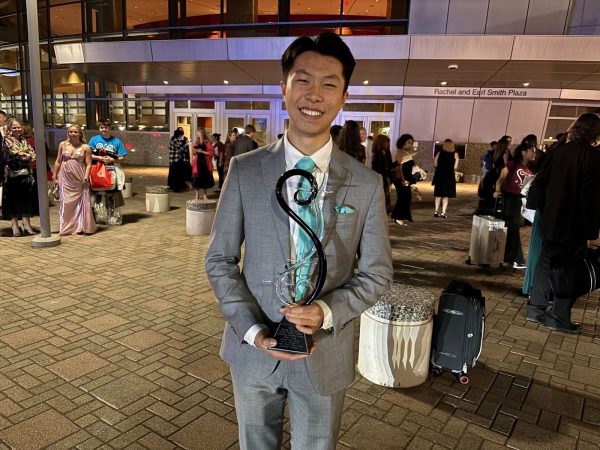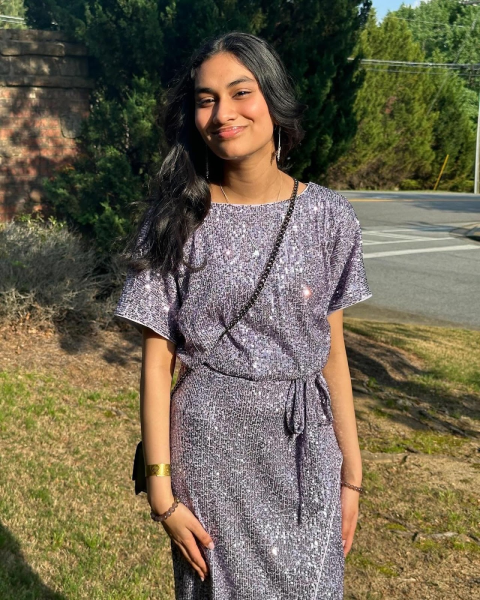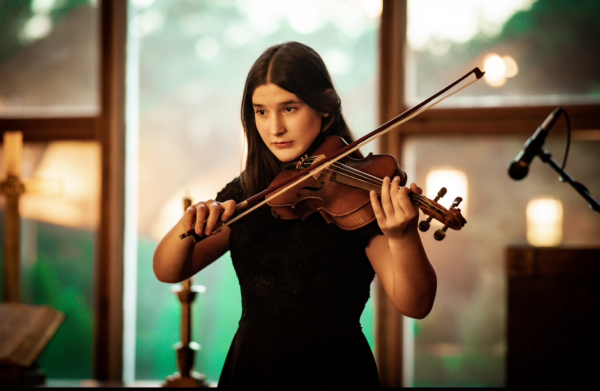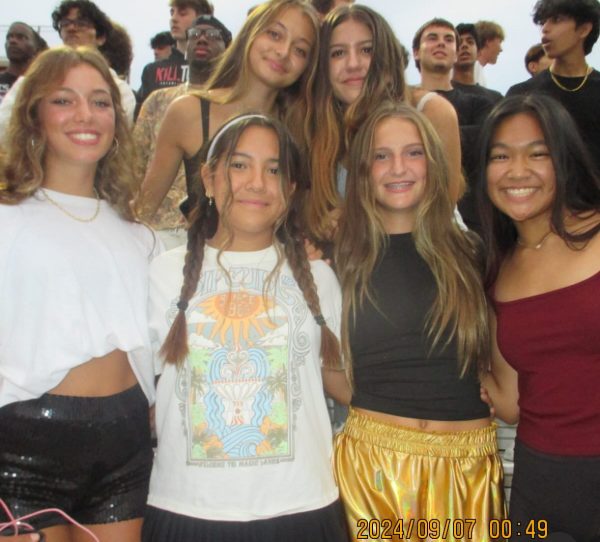Musically Connected: How Does Music Affect Us?

Photo of Yuliya Busumatrava (center) Joey Hassett (right), and Shaan Rama (left). Three Lambert students who are passionate about music. Taken by Taylor Petrofski December 7th, 2021.
Music is everywhere. Music occludes the silence of cars, streets and cinemas. The music in the supermarket can affect your buying habits. When classical music is played in a restaurant, customers have been proven to spend more. Music appears in every culture – telling stories, expressing emotion and sharing ideas. Music is a universal tool that wields a powerful influence on humans and society.
Historically, music has helped people form tribal bonds, and often served religious and spiritual needs. Some of the earliest instruments discovered were made from swan wing bones and are between 39,000 and 43,000 years old. During the American Revolution, groups of professional musicians were paid by military officers to perform for American, French and British regiments. With time, new instruments have been developed and more sophisticated and complex sounds have been produced. Despite the natural selection of music, one thing remains indifferent:
From the National Anthem being performed at sporting events and hymns in worship to parents singing lullabies to their infants, music is a connective force that helps people experience a sense of community. New research suggests that the release of endorphins from playing music or singing together may be a particularly successful method in encouraging social closeness.
In a 2016 study, researchers compared the effects of singing together in a small choir of about 20-80 people to a larger choir of over 200. It was concluded that both groups experienced increased measures of closeness and pain thresholds. However, the group of 200 experienced significantly larger changes in social closeness after singing than the smaller group.
Although it’s unclear exactly why this happens, music increases coordination and cooperation with others. It is believed that coordinating movement with another person releases endorphins, which may explain why we get those warm, positive feelings when we make music together.
“Music increases trust between individuals and increases one’s chances of future cooperation—important factors in human evolutionary success and societal stability,” Berkley.edu suggests.
Accordingly, music has a predominant role in the lives of teenagers. Music helps teens explore ideas and emotions and gives them a safe way to express themselves. Exposure to positive influences through music can help teens learn coping mechanisms and appropriate responses to stressful situations. Music also helps teens connect to social groups and gain a feeling of belonging.
Yuliya Busumatrava, a junior at Lambert, is a music enthusiast.
“I use music as an outlet,” Busumatrava explained. “Whenever I’m in a certain mood, I listen to that type of music.”
Because of its rhythmic and melodic aspects, music engages the neocortex of the brain, which calms us and reduces impulsivity. We often utilize music to match or alter our mood.
Yuliya is an avid Kid Cudi fan and credits the rapper for encouraging positive mental health.
“For me, Kid Cudi and his music genuinely keeps me going,” she said. “Music is always there for me to know that I’m not alone.”
Researchers from the MARCS Institute for Brain, Behaviour and Development have found that music elevates your mood and motivation, encourages relaxation, improves focus and reduces anxiety and depression. A recent report titled “Music on Our Minds,” from the Global Council on Brain Health (GCBH), a working group of scientists, health care professionals and other experts, highlights research showing music’s positive effect on emotional well-being, including improving moods and decreasing anxiety.
“When I was in a place where I was really struggling with my mental health, music showed me how beautifully you can express life,” Yuliya shared. “I didn’t want to miss out on that.”
Music has had a major impact on Yuliya’s relationships as well.
“My dad and I connect over music,” she expressed. “He shows his love for me by sending me a new song to listen to.”
Yuliya bonds with her friends through collaborative playlists and sharing songs with each other.
“The most amazing thing you can do for me is to share a song or playlist you love, so I can listen to it,” Busumatrava professed.
Yuliya has also learned from the music she listens to. She said it’s improved her worldview and given her perspective on other people or situations she hasn’t experienced.
“I started listening to artists like JPEGMAFIA and Kendrick Lamar,” Yuliya stated. “They voice their opinions about political situations and social injustices.”
Music is a great teaching tool. Florida National University found that music activates both the left and right brain at the same time, maximizing learning and improving memory.
Lambert senior, Joey Hassett, is also passionate about music.
“I’ve been able to formulate really strong opinions because of people like Kendrick Lamar,” Hassett said. “Music has exposed me to new ideas around the world.”
Joey and Yuliya became friends because of their shared music tastes.
“I’ve made most of my friends through talking about music,” Hassett explained.
Music directly impacts oxytocin levels, which, in turn, affect our ability to trust and act generously toward others — factors that increase our social connection. Paired with the release of dopamine, the “happy-hormone,” music makes us feel good and allows us to connect with others.
“The easiest way to understand how a person is feeling is through music,” Yuliya said.
Music has profound effects on both the mind and body; upbeat music can make you excited and positive about life, while a slower tempo can be comforting and release the stress of the day.
“I love music because it is my safe place and it’s there when nobody else is,” Yuliya said.
Your donation will help support The Lambert Post, Lambert High Schools student-run newspaper! Your contribution will allow us to purchase equipment and cover website hosting costs.












